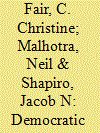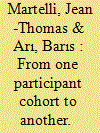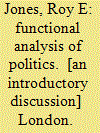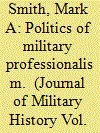| Srl | Item |
| 1 |
ID:
133712


|
|
|
|
|
| Publication |
2014.
|
| Summary/Abstract |
A long-standing research tradition on political culture argues that greater support for core liberal values leads to a rejection of destructive political activities and reduced support for violent politics. In this vein, many contemporary analysts of security policy contend that a lack of democratic values in the Middle East promotes the development of violent political organizations. Unfortunately, there have been few direct tests of the hypothesis that an individual's rejection of democratic values correlates with support for militant groups. We conduct such a test in Pakistan using an original 6,000-person provincially representative survey. We find that strong supporters of democratic values are actually more supportive of militant groups and that this relationship is strongest among those who believe that Muslim rights and sovereignty are being violated in Kashmir. This is consistent with the context of Pakistani politics, where many militant groups use the principle of azadi (i.e., freedom and self-determination) to justify their actions. These results challenge the conventional wisdom about the roots of militancy and underscore the importance of understanding how local context mediates the influence of civic culture on political stability and violence.
|
|
|
|
|
|
|
|
|
|
|
|
|
|
|
|
| 2 |
ID:
160687


|
|
|
|
|
| Summary/Abstract |
Several recent studies propose that political choices of Indian youth can hardly be distinguished from those of their parents in many respects. Contrary to this well-established understanding, this article shows that when set apart from the spheres of family and work, students in a flagship Indian university—mostly in the social sciences and humanities—gradually transform their political attitudes in light of prolonged exposure to a campus environment. Through combining ethnographic study with the analysis of a survey of political attitudes of Jawaharlal Nehru University (JNU) students, we show that time spent in situ fosters participation to political activities, increases chances of joining a student organization and make students more likely to identify themselves as politically radical. The class and caste background of students, on the other hand, are not strongly associated with political attitudes, showing the integrative nature of politicization on the JNU campus.
|
|
|
|
|
|
|
|
|
|
|
|
|
|
|
|
| 3 |
ID:
031640


|
|
|
|
|
| Publication |
London, Routledge and Kegan Paul, 1967.
|
| Description |
viii,101p.
|
| Series |
Library of political studies
|
|
|
|
|
|
|
|
|
|
|
|
Copies: C:1/I:0,R:0,Q:0
Circulation
| Accession# | Call# | Current Location | Status | Policy | Location |
| 001244 | 320.4/JON 001244 | Main | On Shelf | General | |
|
|
|
|
| 4 |
ID:
145257


|
|
|
|
|
| Summary/Abstract |
This article examines how the political activities of antebellum U.S. engineering officers on behalf of the Engineer Company demonstrate the range of mid-nineteenth-century military professionalism. These efforts indicate their sense of a professional responsibility to provide the nation with the military capability to defend itself, but this lobbying was circumscribed by the engineers’ awareness that as officers they had to remain subordinate to the civil government and its policies. This tension can be seen in the methods officers selected for their lobbying and in the internal politicking within the U.S. Army Corps of Engineers over the company’s proper role.
|
|
|
|
|
|
|
|
|
|
|
|
|
|
|
|